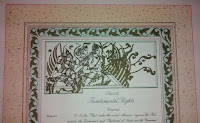CURSE OF THE KING:
In this episode I wish to write about Karna, my favorite character in any epic that I have read. I base my
writing on the
original "Mahabharatham" translated from Sanskrit by Shri Kisri Mohan Ganguli published between 1883 and 1896.
This is taken from
Shanti Parva of the Great Epic
Srimath Mahabharatham. This I would consider the most poignant scene in the great epic.
The war was over. King Yuthishtira followed by his brothers and the grieving Kshatriya ladies who had lost their husbands and kins proceeded slowly to the
mother Ganga to perform last rites to the departed souls in the form of
Tharpanam (Oblations) as prescribed by scriptures. After completion of the ritual,Yuthishtra looked at his mother and told that he had complted his duty to the departed souls of all his relatives who had given up their lives in the battle. But he saw his mother shedding tears and tried to express some thing more.
Rajamatha Kunthi could not control her tears and turned to Sri Krishna in despair. Then Sri
Krishna looked at Rajamatha and nodded his head. Rajamatha Kunthi told King Yuthishtra that there is one more Kshatriya soul for which he should perform
Tharpanam, he was none other than Karna her first child and their elder brother.
. She continued telling the story in a feeble voice, about her first child Karna, whom when she was Princess Kunti got through by testing the boon bestowed on her by Sage Durvasa and how she hid the truth all these years.
Shocked by the sudden revelation Pandavas could not control their grief, but performed the oblations to the departed soul of their elder brother Karna.
However, King Yudhishthira, with tearful eyes and heart agitated by grief, said these words,
'In consequence of thyself having concealed thy counsels, this great
affliction has overtaken me!' Possessed of great energy, the righteous king, then, in sorrow,
cursed all the women of the world, saying, 'Henceforth no woman shall succeed in keeping a secret.' The king, then, recollecting his sons and grandsons and kinsmen and friends, became filled with anxiety and grief. Afflicted with sorrow, the
intelligent king, resembling a fire covered with smoke, became overwhelmed with despair."
9 ity ukto dharmarajas tu matra ba?pakulek?a?a?
uvaca vakya? dharmatma sokavyakula cetana?
10 bhavatya gu?hamantratvat pi?ito 'smity uvaca tam
sasapa ca mahateja? sarvaloke?u ca striya?
na guhya? dharayi?yantity atidu?kha saman vita?
MB: 12-6( 9 &10)










